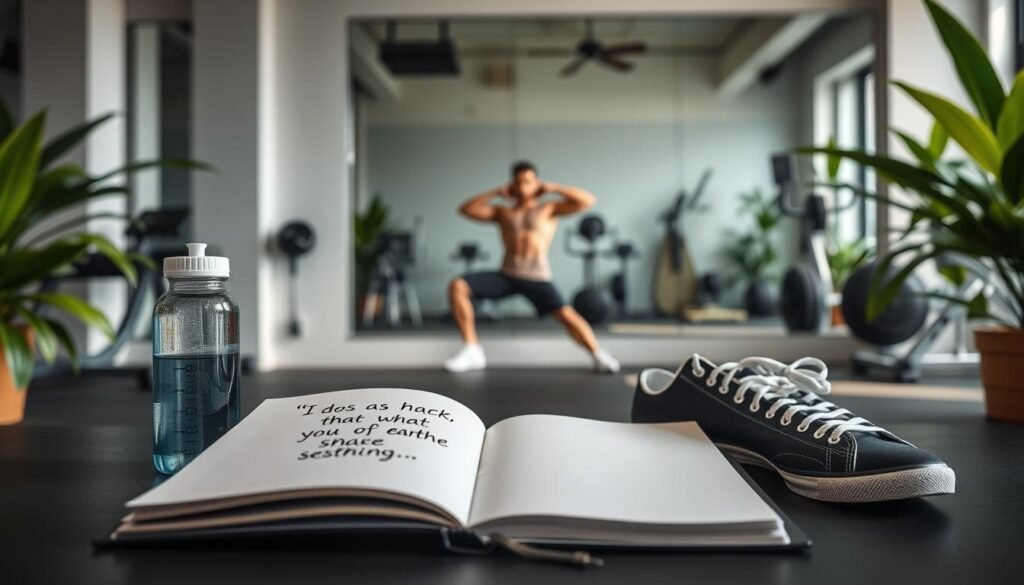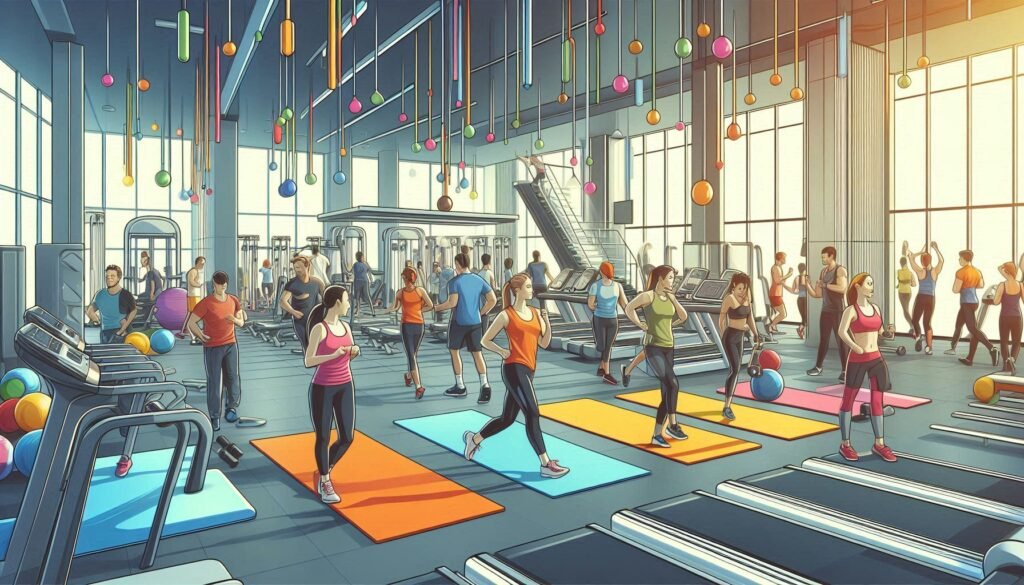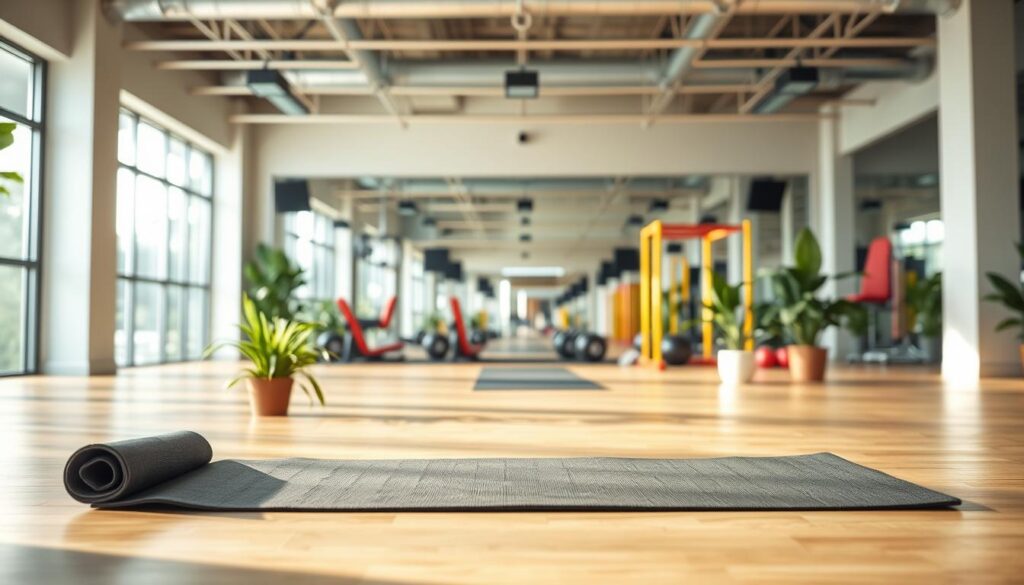Ever felt scared to go to the gym? You’re not alone. Many people struggle with gym anxiety, even after the COVID-19 pandemic. It’s about fears of how you look, your abilities, or what others might think.
But exercise is great for your body and mind. By facing and beating gym anxiety, you can enjoy the many benefits of working out. This article will help you understand gym anxiety and offer ways to overcome it, so you can enjoy your fitness journey.
Key Takeaways
- Gym anxiety is a common issue affecting many individuals, including those returning to gyms post-COVID-19 pandemic.
- Anxiety disorders affect nearly 30% of adults, making it vital to tackle gym anxiety for health benefits.
- Strategies to beat gym anxiety include researching, taking tours, asking questions, and getting help from trainers.
- Seeing the gym as a place for learning and fun can help reduce anxiety.
- Having workout buddies or joining group classes can also ease gym anxiety.
Understanding Gym Anxiety and Its Impact
Gym anxiety is a common problem that affects many people. It makes it hard for them to feel confident when exercising. This anxiety can show up in different ways, like feeling nervous or scared at the gym.
Common Signs and Symptoms
Gym anxiety can show up in both physical and mental ways. You might notice a faster heart rate, shortness of breath, or sweating. You could also feel dread, fear of being judged, or want to stay away from the gym.
Why Gym Anxiety Occurs
Gym anxiety often comes from not knowing the gym well. It can also come from fear of being judged or not feeling confident. The gym’s equipment, crowded spaces, and social pressure can make it worse.
Who Is Most Affected
Studies show that women are more likely to feel gym anxiety than men. This might be because of worries about knowledge, confidence, and social anxiety. Younger people, like Gen Z-ers, often fear being judged and avoid the gym because of it.
It’s important to beat gym anxiety and build exercise confidence. This helps manage stress and deal with social anxiety. By understanding why we feel this way and finding ways to overcome it, we can enjoy our fitness journey more.
“Even just a 10-minute brisk walk has been shown to lower anxiety levels.”
The Science Behind Gymtimidation
Gym anxiety, or “gymtimidation,” comes from fear, feeling like an imposter, and social anxiety. A bit of worry can be good, as it makes us safe while exercising. But too much anxiety can hurt our fitness goals.
The fitness world and social media often make us feel bad about our bodies. But, a new trend is about exercising for health and happiness. It’s okay to have different bodies and fitness paths. This change helps with fitness motivation, mental preparation, and feeling confident at the gym.
“Gymtimidation can lead individuals to end a gym session early, skip sessions entirely, or let their gym membership lapse without reinstatement.”
To fight gymtimidation, we need to know why it happens and tackle it. Try new gyms, go with a friend, or wear comfy clothes. Small group classes or personal training can also make you feel more at ease.
Remember, the best way to beat gymtimidation is to see the good in working out. Focus on how it makes you feel and improves your life. This way, you’ll grow more confident and motivated to enjoy the gym.
| Statistic | Percentage |
|---|---|
| Americans experiencing “gymtimidation” | 50% |
| Women in the UK reporting “gymtimidation” | 25% |
| Respondents mentioning fear of judgment, struggling with exercises, and feelings of insecurity as reasons for gym anxiety | 100% |
By facing our fears and staying positive, we can beat gymtimidation. This way, we can enjoy the many benefits of regular exercise.
Common Triggers in the Gym Environment
Going to the gym can make many people nervous, even if they love to exercise. They might worry about using new equipment or what others think of them. These worries can stop them from working out regularly.
Equipment Uncertainty
Not knowing how to use gym equipment is a big worry for many. The variety of machines and weights can be overwhelming. People might avoid using them because they’re scared of doing something wrong or looking silly.
Social Pressure and Judgment
The gym can also make people feel anxious about what others think. This is true for both men and women, but women might feel it more in places like the weight room. Many women don’t do strength training because they’re worried about what others will think.
Crowded Spaces and Peak Hours
When the gym is busy, it can make people feel anxious. The crowds and long wait times can be overwhelming. This can make them feel trapped and stressed, making it harder to enjoy working out.
It’s important to tackle these issues to overcome gym anxiety. By understanding why we feel anxious, we can find ways to deal with it. This helps us to enjoy the benefits of regular exercise.
Mental Preparation Strategies for Gym Success
Overcoming gym anxiety begins with mental preparation. It’s normal to feel nervous at the gym, even if you’re experienced. Start by being patient and gradually getting used to the gym.
Learning about the gym’s layout and equipment beforehand is key. Know where everything is and how to use it. Watching tutorials or learning gym rules can make you feel more at ease.
- Set goals that are about your own progress, not comparing to others. Celebrate your small victories to stay motivated.
- Change negative thoughts to positive ones. Tell yourself you’re strong and deserve to feel good at the gym.
- Use visualization to imagine yourself doing well at the gym. This can boost your confidence.
By focusing on mental preparation, you can turn the gym into a positive experience. It’s a journey to gym confidence and exercise anxiety relief. Be patient and enjoy the benefits of overcoming coping with gym phobia.

“The hardest step is walking through the door. Once you’re there, the rest will follow.” – Unknown
| Gym Anxiety Trigger | Mental Preparation Strategy |
|---|---|
| Fear of Judgment | Focus on your own progress, not others. Remind yourself that everyone is on their own fitness journey. |
| Unfamiliar Equipment | Research and watch tutorials on how to use the equipment. Familiarize yourself with the gym layout. |
| Crowded Spaces | Visit during off-peak hours or consider joining a smaller, more intimate gym. |
Overcoming Gym Anxiety: Practical Steps
Going to the gym can be scary for many. But, with the right steps, you can beat workout anxiety and feel comfortable at the gym. Here are some easy ways to manage gym anxiety:
Pre-Gym Planning
Getting ready is important for workout anxiety help. Learn about the gym, its equipment, and plan your workout. Going during less busy times can also make you feel better.
During Workout Techniques
When you’re at the gym, try deep breathing and focus on your own workout. Using headphones can also make you feel more comfortable at the gym. Remember, everyone’s journey is different, so don’t compare yourself.
Post-Workout Reflection
After your workout, think about what you’ve achieved. Celebrating your success can boost your confidence. Start small, with short visits, and gradually increase your time at the gym.
Having a workout plan or using fitness apps can guide you. This can help you feel more comfortable at the gym. Being consistent and kind to yourself is key to beating gym anxiety and enjoying fitness.
By following these steps, you’ll be on your way to workout anxiety help and a healthier lifestyle.
Building Confidence Through Proper Gym Etiquette
Going to the gym can feel scary, but knowing the gym etiquette helps a lot. It boosts your confidence and helps you feel less scared. Learning the rules helps you and others feel more comfortable.
Respecting others’ space is key. Don’t take up too much room or block others. Clean up after yourself to keep things clean and considerate. During busy times, let others use the equipment too.
- Respect personal boundaries and avoid crowding others.
- Wipe down equipment after use to keep the gym clean and hygienic.
- Be considerate of time limits on machines, specially during peak hours.
Don’t be afraid to ask for help. If you’re not sure about a machine or exercise, ask someone. They usually want to help and make the gym a better place for everyone.
“Proper gym etiquette not only helps you feel more confident but also creates a welcoming atmosphere for everyone.”
Following gym etiquette makes you feel more comfortable and helps everyone. A little thoughtfulness can make a big difference. It helps you overcome fear and reach your fitness goals.

Creating a Supportive Fitness Environment
Building a supportive gym environment helps fight gym anxiety. Surrounding yourself with encouragement and guidance boosts confidence. This makes the gym a better place to be.
Finding Workout Buddies
Having a workout buddy adds accountability and support. It makes gym time more fun and less scary. Studies show that a workout buddy can boost motivation by up to 45%.
Joining Group Classes
Group fitness classes create a sense of community. They’re great for those who feel shy at the gym. Classes are led by experts, making you feel more at ease.
Research shows that 80% of people feel more confident in group classes. This lets you focus on your workout, not how you look.
Working with Personal Trainers
Personal trainers can change your gym experience. They teach you how to use equipment and create a workout plan just for you. Training with a trainer can increase your confidence by about 70%.
The ISSA’s Health Coach Certification helps trainers support clients. It’s all about helping people overcome barriers and reach their wellness goals.
By using these strategies, you can overcome gym anxiety. You’ll gain confidence and start a rewarding wellness journey.
Alternative Exercise Options for Anxious Days
When gym anxiety gets too much, there are other ways to stay fit. You can do home workouts with bodyweight exercises, resistance bands, or follow online videos. These options give you privacy and ease, away from gym stress. Outdoor activities like walking, jogging, or cycling also offer fresh air and a natural setting, helping you focus on your workout without feeling overwhelmed.
For those who prefer easier options, swimming or water aerobics are great. They offer a challenging workout without the gym’s anxiety. By trying these alternatives, you can keep up with your fitness and mental health, even when the gym seems too much.
Bodyweight Exercises at Home
Bodyweight exercises are a simple and effective way to stay active at home. Some great options include:
- Push-ups
- Squats
- Lunges
- Planks
- Burpees
Outdoor Activities for Exercise Anxiety Relief
Getting outside for some fresh air and exercise can change everything for those with exercise anxiety. Try adding these outdoor exercises to your routine:
- Brisk walking
- Jogging or running
- Cycling
- Hiking
- Swimming or water aerobics
It’s all about finding activities you enjoy and that make you feel good. By exploring these options, you can keep up with your fitness goals and take care of your mental health on tough days.
| Exercise Option | Benefits | Considerations |
|---|---|---|
| Home Workouts | Privacy, convenience, no gym crowds | May require investment in equipment |
| Outdoor Activities | Fresh air, natural surroundings, low-impact | Weather and environmental factors |
| Swimming/Water Aerobics | Low-impact, relaxing, versatile | Access to pool or water facility |
“Exercise is a powerful tool for managing anxiety. By finding activities you enjoy, you can prioritize your mental well-being while achieving your fitness goals.”
Conclusion
Overcoming gym anxiety takes time and effort. It’s important to understand why you feel anxious and find ways to deal with it. By doing this, you can start to feel more confident and enjoy the benefits of exercise.
Remember, everyone starts from the beginning. Focus on your own progress, not comparing yourself to others. This mindset helps a lot.
The gym can become a place where you feel strong and healthy. Use the tips from this article, like learning gym rules and finding workout buddies. Taking small steps towards your fitness goals can make a big difference.
The gym is for your personal growth, not for comparing yourself. Celebrate every small victory. Every step towards being healthier and more confident is a success.
With determination and a positive attitude, you can beat gym anxiety. This will open up many benefits of regular exercise for you.




